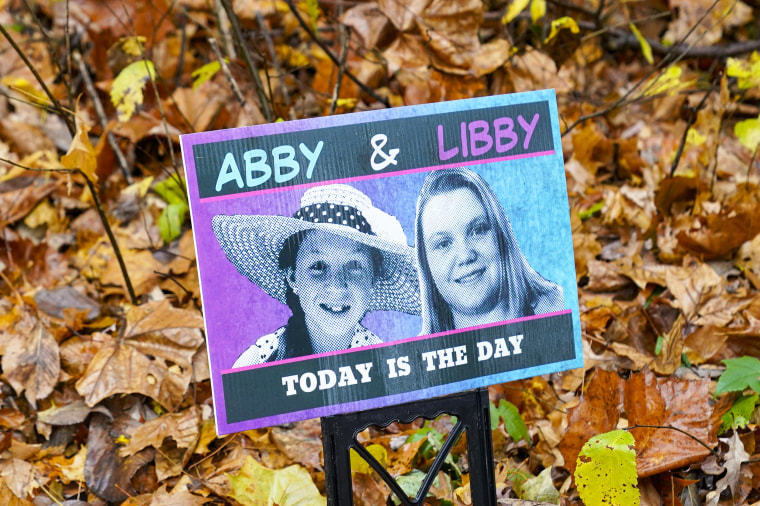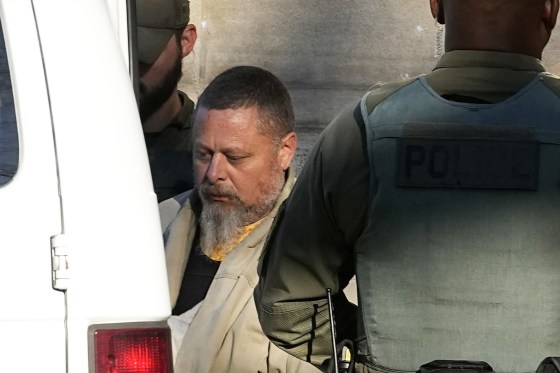Before his arrest, the man charged with killing two middle school girls in Indiana repeatedly told police during a lengthy and at times testy interview that he had nothing to do with their deaths.
But after Richard Allen was charged and awaiting trial at a maximum security prison, he repeatedly confessed to the 2017 killings of Liberty German, 14, and Abigail Williams, 13, near a well-known trail outside the small town of Delphi.
Allen’s contradictory statements were in the spotlight during the second week of his trial in a Carroll County courtroom. Allen, 52, was charged with two counts of murder in 2022 and has pleaded not guilty.
Prosecutors have said Allen used "power and fear" when he forced the girls down a hill at Monon High Bridge Trail on Feb. 13, 2017, and slit their throats.
Allen's lawyers have said he appeared to have experienced serious mental health issues and they've described the killing as a possible ritual sacrifice carried out by followers of a Norse pagan religion popular among some white nationalists.
Jurors on Tuesday saw Allen’s denials in a video that showed an interview with a law enforcement investigator from Oct. 13, 2022. The investigator had sought Allen out after a volunteer file clerk helping organize a database in the probe flagged a mislabeled tip the previous month with Allen’s name on it.
The tip came from Allen himself, who told authorities in the days after the killings that he'd been on the same trail as the girls on the day they disappeared.
In the interview, Allen — then a CVS clerk — provided an account of what he’d done that Feb. 13. He described the outfit he’d worn that day — jeans and a blue Carhartt jacket — and said that after seeing his mother, he went for a walk at Monon High Bridge Trail around noon.
He recalled seeing three girls, he said in the interview, and none of them were Abby or Libby, as the girls were known.
When Allen was asked if authorities could search his car and house, he told the investigator to get a warrant. When asked if they could look through his phone, he said he didn’t want authorities reviewing “every website I’ve gone through.”
“I had nothing to do with it,” he added. “It’s a horrible thing and I don’t want to be more involved than I already am.”

At one point in the interview, an investigator referenced a Snapchat video found on Libby’s phone that shows a man walking on the trail the day of the killing.
When the investigator said the man in the video was wearing the same clothes that Allen had described, Allen replied that such an outfit is common. He’d never met the girls, Allen said.
“I can’t tell you what happened,” he said. “If that picture was taken by those girls, it’s not me. I never met them.”
“You said you were there,” the investigator responded. “You said you walked out to the bridge.”
“No, I didn’t,” Allen said, adding that his words were being “twisted.”
The investigator continued to press Allen on the video, telling him he was the man captured in the images, and Allen continued to deny the allegation.
“Arrest me or don’t,” Allen eventually said. “We’re done here.”
Allen was arrested weeks later, after authorities searched his home and found a gun investigators said matched an unspent round from a .40-caliber pistol found near the girls’ bodies.
Once at Westville Correctional Facility, Allen told prison officials and officers — including the warden — that he killed the girls, prosecutors have said. Several testified this week.
Former prison psychologist Monica Wala, who began seeing Allen in November 2022, testified Wednesday that he confessed to the killings several months later, describing the murders during one session in a “concise” and chronological manner.

Citing a May 2023 clinical report, Wala testified that Allen said he followed the pair across a bridge, ordered them down a hill and across a creek. Allen wanted to sexually assault the girls but didn’t, Wala said, citing the report, so he cut their throats and covered their bodies with branches.
A week later, Wala said, Allen told her he wanted to sign a confession, prompting the psychologist to tell him to speak with his attorneys. A day later, on May 10, Allen called his wife with the psychologist present and told her that he’d killed the girls, Wala testified.
In the weeks before the confession, Wala testified that she saw a change in Allen’s behavior after he received documents related to his prosecution, according to NBC affiliate WTHR of Indianapolis.
Notes of Wala's that were introduced as evidence said that Allen appeared naked, ate his own feces and rolled on the ground, according to the station.
When prosecutor Stacy Diener asked if Allen could have been faking what Wala described as a possible emotional breakdown related to the documents, the psychologist said it was possible but didn’t matter because of how serious his deterioration appeared to be, WTHR reported.
The psychologist's notes from April 12 indicated that Allen had a "grave disability," according to the station.
That May, the same month as Allen's confession, Wala diagnosed him with brief psychotic disorder — an illness that suddenly appears, lasts less than a month and is characterized by several symptoms. Allen showed signs of disorganized speech and behavior, Wala said, but he was not delusional or experiencing hallucinations.The prosecution, which called 40 witnesses over two weeks, rested its case Thursday, WTHR reported. The defense began calling witnesses Thursday afternoon.
